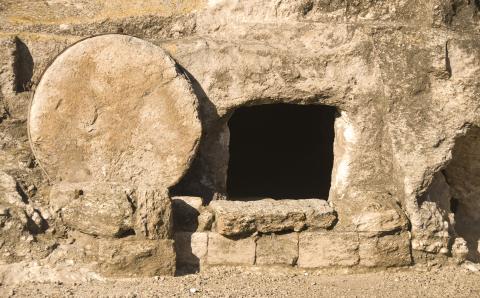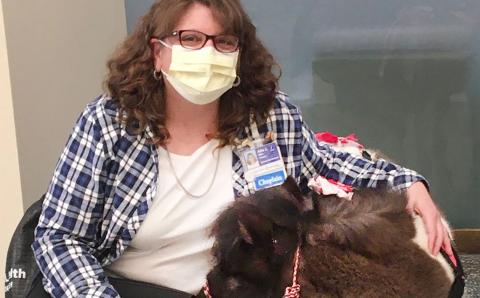Very early in the morning, while it was still dark, Jesus got up, left the house and went off to a solitary place, where he prayed. —Mark 1:35
It is not unusual for me to hear someone say, “I’m struggling with finding time to be alone with God in prayer.” I believe many Christians have this same struggle. Perhaps you have said this yourself. Finding time is a significant barrier to spending time in prayer. It is not always easy to sacrifice and give up something else. Most people have busy lives filled with so many meaningful activities involving family, work, ministry, and personal matters. This is a reality of the 21st century; however, many of us desire to see something different for our current prayer practices.
We can be inspired by Jesus’ example of finding quiet time with God. The gospel of Mark describes how Jesus and his disciples are on the move from one place to another. In the synagogue at Capernaum, people identify Jesus as one who teaches with authority and who, more surprisingly, casts out an impure spirit from a man on the Sabbath. Jesus’ reputation grows, and so do the crowds following him.
His disciples, James and John, accompany him to their next stop, Simon and Andrew’s home. Within moments of their arrival, Jesus is told that Simon’s mother-in-law is sick in bed with a fever. This next part makes me smile.
Jesus goes to her, takes her hand, and helps her up, and the fever leaves her. The atmosphere changes as gratitude and joy fill the room, and she begins to serve them. The news about her healing travels.
Later that evening, Jesus heals all the sick and demon-possessed who come to him. The night was long and draining. The rhythm changes, though.
Jesus probably got some sleep, but there was something far more important on his mind. He enjoyed being with people, but not always. The voices of people questioning his power and authority, of the sick expecting to be healed, and of the disciples faded away. Mark describes Jesus finding an opportune time to leave the house and go to a quiet place to pray. Up to this point, Jesus had been responding to others’ needs. Now he attends to his own needs.
The outer work of ministry and inner work of soul care is propelled by his relationship and oneness with the Father. Jesus prays in solitude, an essential part of his life.
There are two other instances when Mark describes Jesus withdrawing from his disciples and the crowds to talk with God in solitude.
Before feeding the 5,000, Jesus invites his disciples to “come with me by yourselves to a quiet place and get some rest” (Mark 6:31). He invites us today to do the same. After teaching and feeding the crowd, Jesus went up on a mountainside to pray (6:46).
Just before his arrest, late at night, Jesus meets alone with God in Gethsemane (Mark 14:32-41). Mark describes how challenging it was for the disciples to stay awake and pray nearby.
In Mark 1, he purposefully leaves while the disciples are asleep. We note the importance of alone time with God. Little is known about what happened in these moments of solitude and prayer, but I believe it was critical for Jesus’ well-being and mission to regularly set aside his public ministry to get away to pray. He left the regular routine of things behind.
We can learn from Jesus’ example. It begins with a desire to get away for some time alone with God in prayer.
My first retreat experience occurred when I was in seminary: a one-day respite from the typical routine of attending classes and studying. We received an optional prayer guide with biblical themes and Scripture passages. I had access to my Bible, a hymnal, a journal, a prayer shawl, and a prayer rug. There was also a prayer tower available on campus. (These types of dedicated places for prayer are becoming more common on seminary campuses.)
The thought of being alone might not be easy if we do not like to be alone.
Retreatants were told not to interact with each other, but to practice silence. At the beginning of the day, I could not imagine how fruitful and fulfilling this experience would be. Since then, it has become a regular part of my life.
When is the right time to pray alone? Some faith traditions practice morning, midday, and evening times of prayer. It takes time to figure out what works best for your lifestyle. There is no set format.
Different seasons of the year or life rhythms require schedule adjustments. Jesus prayed for hours at a time and sometimes all night. Some individuals spend from a few days or even longer at a retreat or monastic center, seeking God’s face using labyrinths, libraries, bird-watching, and nature trails.
In my travels, sometimes I choose to stay at a monastic center instead of a hotel. If a retreat center is not an option, a long walk at the lake or some other safe, secluded place can be a good space to meet God in prayer.
How to Get Alone Time with God
Being alone with God means we must temporarily disconnect from our family, friends, and coworkers, our ordinary situations, and our possessions. Some people put in their calendar an event called “Meeting with God” or “Quiet Time.”
For this to happen, our family, work, and school responsibilities must be covered by someone else. Hopefully a relative or close friend will see the value of this time away and graciously meet our needs.
Our laptops and cellphones must be powered off and out of sight. No peeping on social media or reading the news. We do not need to feel guilty about doing what seems to be “nothing” or “unproductiveness.”
When I was pastor at Immanuel CRC in Kalamazoo, Mich., our council went away for a one-and-a-half-day planning retreat. For some it was a challenge. Several of us worked a full day before arriving at the Hermitage Community retreat center in Three Rivers, Mich., in time for a 5:30 p.m. dinner together.
As the retreat facilitator, I asked everyone to practice silence from dinnertime until our first meeting the next morning. The intent was to give us time to disconnect from our busy schedules and to have time alone with God.
When told about this arrangement, one person was upset. This person worked in a critical care environment and was looking forward to great conversations at the dinner table and late into the night. But we followed the original plan.
The next morning all of us gave testimonies about how we needed this time of solitude. The person who was initially upset was now grateful.
In her book Sacred Rhythms: Arranging Our Lives for Spiritual Transformation, Ruth Haley Barton talks about getting in touch with what’s true about us.
“Most of us are more tired than we know at the soul level,” she writes. “We are teetering on the brink of dangerous exhaustion, and we really cannot do anything else until we have gotten some rest.”
We do not easily disconnect from patterns and practices that have become so much of our life. But purposefully connecting with God—speaking, listening, and being silent in God’s presence—can be an adventurous, reverential, and liberating experience.
God does not communicate with everyone in the same way. God connects with us through Scripture, circumstances, and the Holy Spirit. We must intentionally engage God’s Word and place ourselves in a position or posture to receive.
Jesus prayed during in-between times of a typical day of ministering to others and teaching the disciples; he intentionally went off by himself to pray. He was free at the moment! We must trust the Spirit and do the same, showing up before God as we are. We need not worry about anything; it is a safe place.
Purposefully connecting with God might involve going alone to a particular place that has meaning for you, such as a lake, a nature trail, a mountain, or a retreat center. I live about 45 minutes from beautiful Lake Michigan. Sometimes I am drawn to the lake—even in winter!—because it is one of my quiet places to meet our God.
If you decide to stay at home, you might choose a comfortable chair, your crafting corner, a designated prayer closet, or somewhere else for a private time in prayer.
During these times of quietness, we grow in knowing God and ourselves. When we struggle with something, or when illumination or conviction happens based on a recent sermon we heard, the Spirit might prompt us to pray. Dallas Willard describes it this way in his book The Spirit of the Disciplines: Understanding How God Changes Lives: “In solitude, we confront our own soul with its obscure forces and conflicts that escape our attention when we are interacting with others.” These matters might influence the intensity of how we pray and what we pray for.
Being alone in prayer might mean being in a position of vulnerability in which we open ourselves to God. We get real with God about what we think and feel without mincing our words. God knows what is in our hearts and minds. We carry our thoughts, experiences, pain, and emotions with us. Life can be hard at times. There is value in bringing our reality to the Lord in prayer:
“Praise be to the God and Father of our Lord Jesus Christ, the Father of compassion and the God of all comfort, who comforts us in all our troubles, so that we can comfort those in any trouble with the comfort we ourselves receive from God” (2 Cor. 1:3-4).
In Psalm 63:1-8, David describes his times of trouble in the wilderness. He is thirsty and longing for God in a barren place away from his home and place of worship. Yet he seeks and depends on God.
During the COVID-19 pandemic, we might have felt depleted, tired, alone, and unable to go to our place of worship. We went to secret closets or quiet places, seeking comfort and assurance of God’s help.
None of God’s people is exempt from hard times. The key is knowing who we belong to and from where our help comes. There are some things in life no one but God knows about, and he is the only one who can turn the situation around. Thanks be to God!
Jesus faced his most vulnerable and intimate moments in Gethsemane, a familiar quiet place to be on his knees, alone with Abba, his Father, in hope of another way. He “prayed more earnestly, and his sweat was like drops of blood falling to the ground” (Luke 22:44). Jesus rested in knowing his Father’s will.
It is God’s will for us to make time to be alone with him in prayer. We might struggle, but it will not be a struggle one day when we least expect it. Our struggle will become a longing to be with our God, who loves us and whom we love.
May God help each of us, our families, and our churches to make room for regular quiet times in prayer.
Discussion Questions:
- Have you struggled to find time to be alone with God? If yes, why? If not, how do you find the time and sustain the practice?
- Share your experiences of prayer retreats or what you know or have heard about them.
- Are you comfortable with silence? Why or why not?
- What will you take away from the article to try to practice in your prayer life this week?
About the Author
Denise L. Posie, M.Div., has served in the ministry of discipleship in redemptive kingdom diversity at Calvin Theological Seminary since 2020. Her upcoming memoir is Called to Remember: Soul Care Through Spiritual Encounters.







